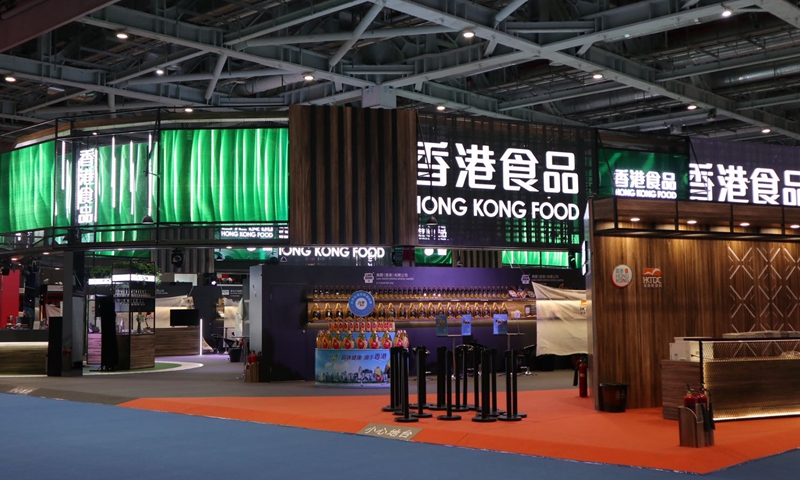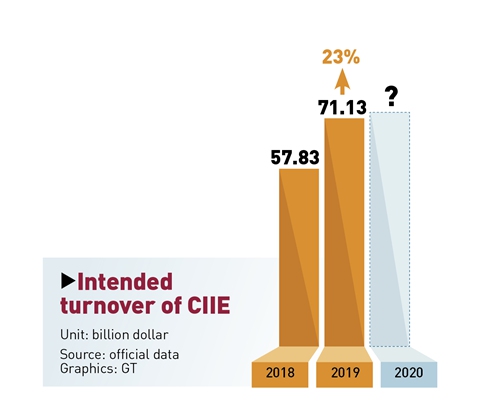HK companies seek business opportunities in mainland via CIIE
By Qi Xijia and Chu Daye Source: Global Times Published: 2020/11/4 20:18:40
City’s economy hit by social unrest, COVID-19

The booth of Hong Kong Food is ready to receive visitors for the third China International Import Expo. Photo: Courtesy of HKTDC
Hong Kong companies attending the third China International Import Expo (CIIE) are eyeing a new role in the country's dual circulation strategy and seeking a buffer zone from the economic onslaught of the COVID-19 pandemic, China-US trade war and local social unrest last year.
After the global financial hub's economy plunged 3.4 percent in the third quarter following a 9-percent drop in the second, the Hong Kong Trade Development Council (HKTDC) sent a delegation of 45 companies to the third CIIE, despite the quarantine requirement for epidemic prevention. The exhibition area has increased 20 percent from last year.
The CIIE, one of the world's largest trade shows that kicked off on Wednesday, showcases China's enormous opportunity for global companies after the country became the first major economy to achieve growth since COVID-19 crippled the world economy.
For Hong Kong companies, the event has special significance.
Liang Jiaxian, a manager with the Guangzhou branch of FS International, a Hong Kong-based international logistics company, told the Global Times that her company will introduce its new import logistics platform in the bonded area of Qianhai Bay in South China's Shenzhen - China's pioneering city of reform and opening-up - at the CIIE as the company has invested more resources and talent to cultivate the Chinese mainland market. FS International has doubled the area of its booth this year due to fruitful results from the previous trade show in 2019.
"Nearly 80 percent of our major projects nowadays are conducted in the mainland, even though we have been operating in Hong Kong for the past three decades," Liang told the Global Times on Wednesday.
"We hope to take part in the opportunity of dual circulation to improve our business, which is also focused on the integration of international and domestic operations," Liang said.
Jacky Chung, director of the Chinese mainland for the HKTDC, said his agency will roll out targeted services to help more Hong Kong companies get involved in the internal circulation of the domestic market, as well as serve as a connecting point for the internal and external circulation components.
Concrete measures will include helping Hong Kong companies to develop retail business in the mainland and tackling issues such as logistics and payment.
"We really appreciate that the motherland treats Hong Kong preferentially at this special time of COVID-19," Ken Wong, director of All Time Healthy Co, a Hong-Kong based healthcare product company, told the Global Times on Wednesday.
The CIIE is a very good platform to act as a bridge between Hong Kong companies and mainland companies, he said.
"Hong Kong can take advantage of its position as a tax-free financial hub to introduce high-quality products to domestic markets through the platform of the CIIE," Wong said. This year is the third time that his company has participated in the CIIE, and it has booked two booths, just like last year.

Graphics: GT
China's just-released 14th Five-Year Plan (2021-25) puts an emphasis on the "dual circulation" model of growth, vowing to boost domestic demand to make the nation's market the largest consumption market in the world.
At a time when exports are hindered by the COVID-19 pandemic, Chung said that the CIIE is seen as an important platform for Hong Kong to tap into the mainland market, which has become a major growth point for Hong Kong companies.
"With export orders withering, Hong Kong's export-oriented businesses are lucky to have the domestic market, with its huge potential, as the mainland economy is recovering from the COVID-19," Chung told the Global Times on Wednesday.
He noted that some Hong Kong enterprises he knew of that used to make electrical appliances and coffee machines are adjusting their models and standards this year so that their products can be sold in the domestic market.
With its commerce and tourism battered by the pandemic, the city has also gotten caught in a trade war between the US and China, with the Trump administration requiring city-produced exports to be labeled "Made in China". Hong Kong formally launched a legal procedure against the US at the WTO on Friday.
Hong Kong Special Administrative Region (HKSAR) Chief Executive Carrie Lam Cheng Yuet-ngor is visiting a number of mainland cities including Beijing, Guangzhou and Shenzhen to seek ways to shore up the city's economy, and discuss on the Greater Bay Area development and Hong Kong-Shenzhen cooperation.
In September, Hong Kong's exports rebounded to post 9.1-percent annual growth, ending a declining streak that lasted for six months. Financial Secretary Paul Chan Mo-po said the rebound was on the back of a recovering Chinese mainland economy.
"The opening-up policy mentioned by the central government to further open up the domestic market to Hong Kong's business sectors comes as good news for us," Chung said.
Newspaper headline: HK companies seek growth points in mainland
Posted in: INDUSTRIES,ECONOMY,BIZ FOCUS